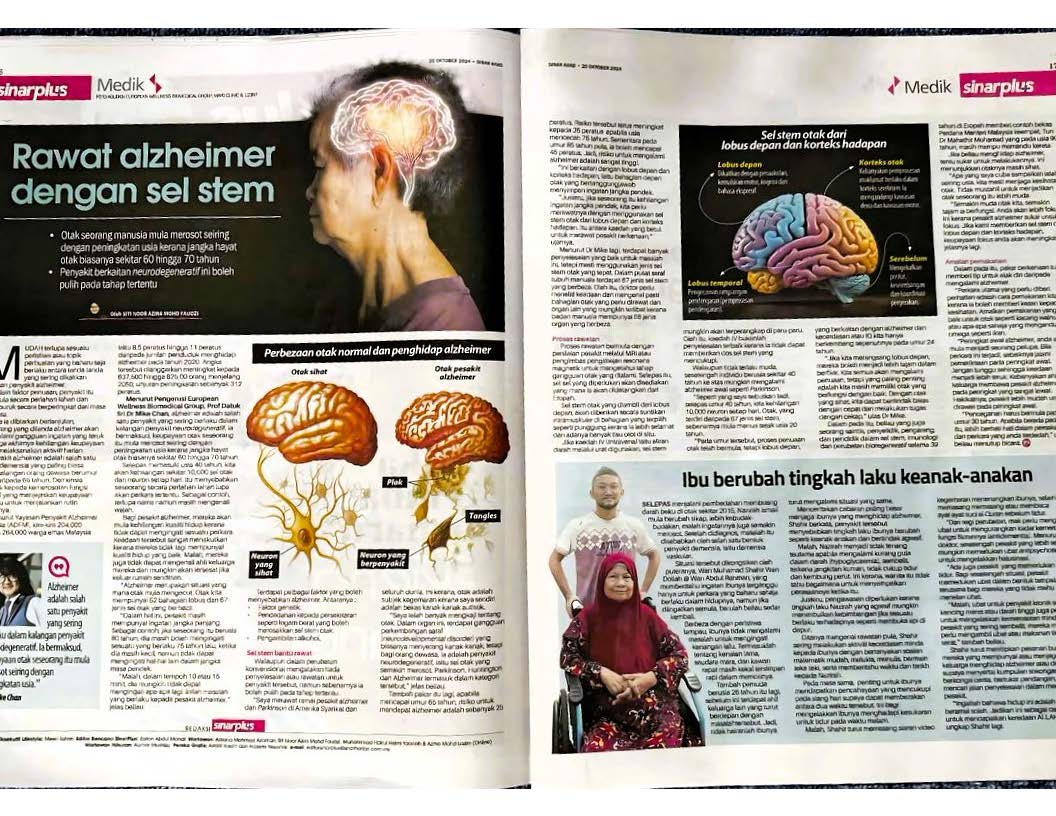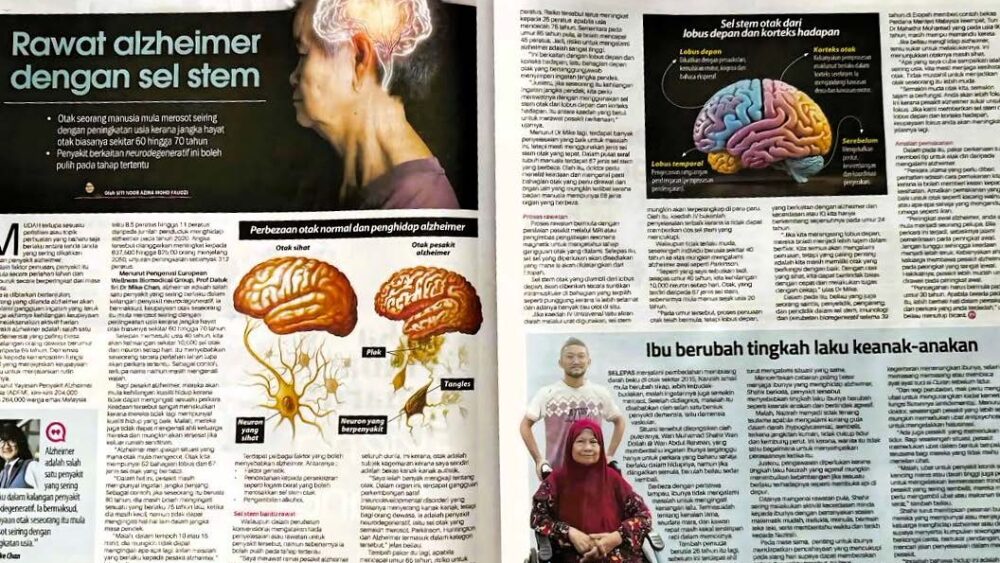KUALA LUMPUR, Oct 20, 2024 – Sinar Harian has published an exclusive feature today on the pioneering work of Professor Dato’ Sri Dr. Mike Chan, focusing on his revolutionary research into the use of stem cell therapy for treating Alzheimer’s disease.
The article, written by Siti Noor Azira Mohd Fauzi, offers readers an in-depth look at Prof. Chan’s findings and the significant potential they hold for the future of neurodegenerative disease treatment.
The article entitled: “Treat Alzheimer’s with Stem Cells” discusses how Alzheimer’s is becoming an increasing concern in Malaysia, affecting up to 264,000 elderly individuals, with projections of up to 825,000 by 2050. The report delves into Prof. Chan’s research, which highlights how stem cell therapy—specifically, the use of brain stem cells harvested from the frontal lobe—could slow the progression of Alzheimer’s and potentially reverse some of its debilitating effects.
Prof. Chan’s insight into how the brain begins to lose 10,000 neurons a day after the age of 40, leading to memory loss, is also explored in the piece. His innovative approach using stem cells aims to support memory retention, helping Alzheimer’s patients maintain cognitive function and independence for longer periods.
The Sinar Harian article also touches on contributing factors to the disease, such as genetics, environmental factors, and lifestyle choices. Readers are reminded that early detection and intervention are key to improving outcomes for Alzheimer’s patients.

Treat Alzheimer’s with Stem Cells
Reported by Siti Noor Azira Mohd Fauzi
The Difference Between a Normal Brain and an Alzheimer’s Brain
- Healthy neurons
- Normal brain
There are several factors that may cause Alzheimer’s, including genetic factors, exposure to environmental factors such as heavy metals that can damage stem cells, and alcohol consumption.
“The brain of a human begins to deteriorate with age because its lifespan is typically around 60 to 70 years. Neurodegenerative diseases can be treated to a certain extent.” – Prof. Dato’ Sri Dr. Mike Chan
In recent conversations related to Alzheimer’s disease, it was highlighted that this condition often accompanies aging. The disease starts slowly and worsens gradually over time.
If left untreated, a person with Alzheimer’s will experience severe memory loss, eventually losing the ability to perform daily activities.
Alzheimer’s disease is one of the most common forms of dementia among adults over the age of 60. Dementia refers to the decline of cognitive functions that affect an individual’s ability to carry out daily routines.
According to the Alzheimer’s Disease Foundation Malaysia (ADFM), between 204,000 and 264,000 elderly Malaysians suffered from Alzheimer’s disease in 2020. This figure is expected to rise to between 637,500 and 825,000 people by 2050, marking an increase of 312%.
“Alzheimer’s is one of the common neurodegenerative diseases, which means that the brain’s capability deteriorates as a person ages,” – Prof. Dato’ Sri Dr. Mike Chan.
Between 8.5% and 11% of the population was affected by Alzheimer’s in 2020. This figure is projected to rise significantly by 2050.
According to the Chairman of European Wellness Biomedical Group (EWBG), Prof. Dato’ Sri Dr. Mike Chan, Alzheimer’s is one of the common neurodegenerative diseases. This means that the brain’s capability deteriorates with age, as the lifespan of the brain is typically around 60 to 70 years.
After the age of 40, we lose approximately 10,000 neurons each day, which causes people to gradually forget certain things. For example, they may forget names but still recognize faces.
For Alzheimer’s patients, the quality of life declines as they can no longer remember things. This condition is terrifying because they no longer have a good quality of life. In severe cases, they may not recognize their family members and may even get lost if they leave the house alone.
“Alzheimer’s is a condition where the brain shrinks. Our brain has 52 lobes and 67 different types of brain cells. In this situation, the patient may retain long-term memory. For example, an 80-year-old individual may still remember things from 75 years ago but struggle with short-term memory,” he explained.
“In as little as 10 to 15 minutes, an Alzheimer’s patient may forget everything that happened.”
Stem Cells Help in Treatment
Although conventional medicine states that there is no cure for the disease, it is actually treatable to some extent.
“I treat many Alzheimer’s and Parkinson’s patients in the United States and worldwide. The brain is my favorite subject, as I was once a child prodigy. I have studied the brain extensively.
In this organ, there are neurodevelopmental disorders that primarily affect children, but for adults, they manifest as neurodegenerative diseases, where brain cells deteriorate. Parkinson’s, Huntington’s, and Alzheimer’s fall into this category,” he explained.
Prof. Chan added that after the age of 65, the risk of developing Alzheimer’s is 25%. This risk increases to 35% at age 76, and by age 85, it can reach 45%. The likelihood of developing Alzheimer’s is extremely high at this age.
This condition is associated with the frontal lobe, which is responsible for storing short-term memory. Therefore, when someone loses short-term memory, we treat them using brain stem cells from the frontal lobe.
Treatment Process
The treatment process begins with a detailed examination, often using an MRI scan to assess the level of brain damage. After that, the necessary stem cells are prepared, usually sourced from Europe.
Brain stem cells extracted from the frontal lobe are injected intramuscularly into selected areas, such as the buttocks, as it is safer due to the abundance of capillaries. Using IV (intravenous) methods is not as effective as stem cells can get trapped in the lungs, making this approach less optimal.
Even though the process is complex, early signs of conditions like Parkinson’s can be seen in individuals as young as 40 years old.
As I mentioned earlier, after the age of 40, we lose 10,000 neurons daily. The brain, which consists of 67 types of cells, begins to age from the age of 20.
By the age of 40, brain aging has already begun. However, some people are still unaware that their brains have started to age at this point.
Stimulating Brain Lobes
Prof. Chan also highlighted the importance of maintaining brain health:
It’s possible to keep the brain functioning optimally. Younger stem cells can help enhance focus. For Alzheimer’s patients, stimulating the frontal lobes can significantly improve brain sharpness.
He also emphasized the importance of a healthy diet, including foods rich in omega, like walnuts.
In the early stages of Alzheimer’s, symptoms like forgetfulness begin to manifest. It is important to seek early treatment rather than waiting for the condition to worsen. Unfortunately, most families only bring Alzheimer’s patients for treatment when the disease is at an advanced stage.
Conclusion
Prevention should start as early as in one’s 30s. By maintaining a healthy lifestyle and eating well, one can reduce the risk of Alzheimer’s.
Prof. Chan, a scientist and educator in stem cells, immunology, and regenerative medicine, shared an example:
Former Malaysian Prime Minister, Tun Dr. Mahathir Mohamad, at 99 years old, is still capable of driving a car. This shows that his brain is healthy.
What I’m trying to say is that, regardless of age, we need to take care of our brain health. It is not impossible to maintain a healthy brain.



Comments are closed.